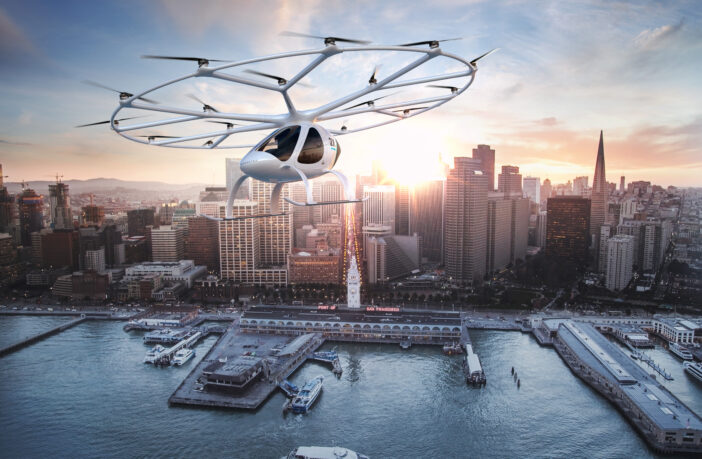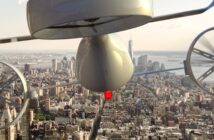We have been hearing about electric-only flying taxi services for some time. Companies like Lilum, Kitty Hawk and eHang have all been taking tentative steps towards creating the hardware for the ‘Ubers of the air’, mainly perfecting electric VTOL (vertical take-off and landing) aircraft. In theory, VTOL vehicles could provide a more environmental alternative to energy-hungry current transportation modes, while, at the same time avoiding urban congestion.
Up until now the technology hasn’t arguably been advanced enough and discussions with regulators are in their infancy.
Yet in major shot in the arm for VTOL transport Volocopter, a German startup that has been working away in the space since 2011 has picked up €200 million (about $241 million) in a Series D round of funding, and it says it can deliver live taxi services within two years.
Volocopter has also been building a business case in which its vessels will be used in a taxi-style fleet in urban areas which it calls VoloCity
CEO Florian Reuter told TechCrunch
“We are actually expecting to certify our VoloCity in around two years and start commercial air taxi operations right after,” he said. “Paris and Singapore are in pole position [as the first cities], where Paris wants to have electric air taxis established for the 2024 Olympics. With our VoloDrone we expect first commercial flights even earlier than with our VoloCity.”
“Volocopter is ahead of the curve in the UAM industry, and we have the achievements to prove it,” he adds. “No other electric air taxi company has publicly performed as many flights in cities around the world, with full regulatory approval, as Volocopter has. Our VoloCity is the fifth generation of Volocopter aircraft and has a strong path to being the first certified electric air taxi for cities. Volocopter already has the extensive partnerships necessary to set up the UAM ecosystem for launching both our company and the industry into commercial operations. We are called the pioneers of UAM for a reason, and we plan to keep that title.”
The company’s ambition has clearly impressed a lot of investors. Its latest round includes cash from funds managed by BlackRock; global infrastructure company Atlantia S.p.A.; Avala Capital; automotive parts company Continental AG; Japan’s telecoms company NTT; Tokyo Century, a Japanese leasing company; multiple family offices are all new investors, among others. Volocopter also said that all of its existing investors — that list includes Geely, Daimler, DB Schenker, Intel Capital, btov Partners, Team Europe, and Klocke Holding and more — also contributed to the round.
Rene Griemens, the company’s CFO said that the partnerships with the companies are in many ways as important as the investment.
“Getting urban air mobility off the ground requires a full ecosystem that we are developing right now. Many of our strategic partners will support us on different aspects of the supply chain, scaling components, entering markets, improving operations amongst others. Most of them know certain aspects of our business model really well (eg. Japan Airlines for aviation, Atlantia for infrastructure),” he said. “Their investment is a reflection of their excitement about Volocopter as a leader in building the entire ecosystem of UAM, thereby giving credibility and comfort for purely financial investors.”
He added that many of these companies have a very “hands-on partnership” with Volocopter. “DB Schenker, for example, is rolling out leading-edge heavily-load electric logistics drones together with us around the globe.”
There’s clearly an opportunity for VTOL companies, especially as the Covid19 pandemic has forced regulators to looks again at new and innovative approaches to transportation. The speed at which the UK pivoted from a largely negative attitude towards electric scooters, to creating a series of trials and arguably turning a blind eye to private scooter owners being a classic example.
How quickly the VTOL companies can convince both regulators and consumers that their transportation systems are safe remains to be seen.




